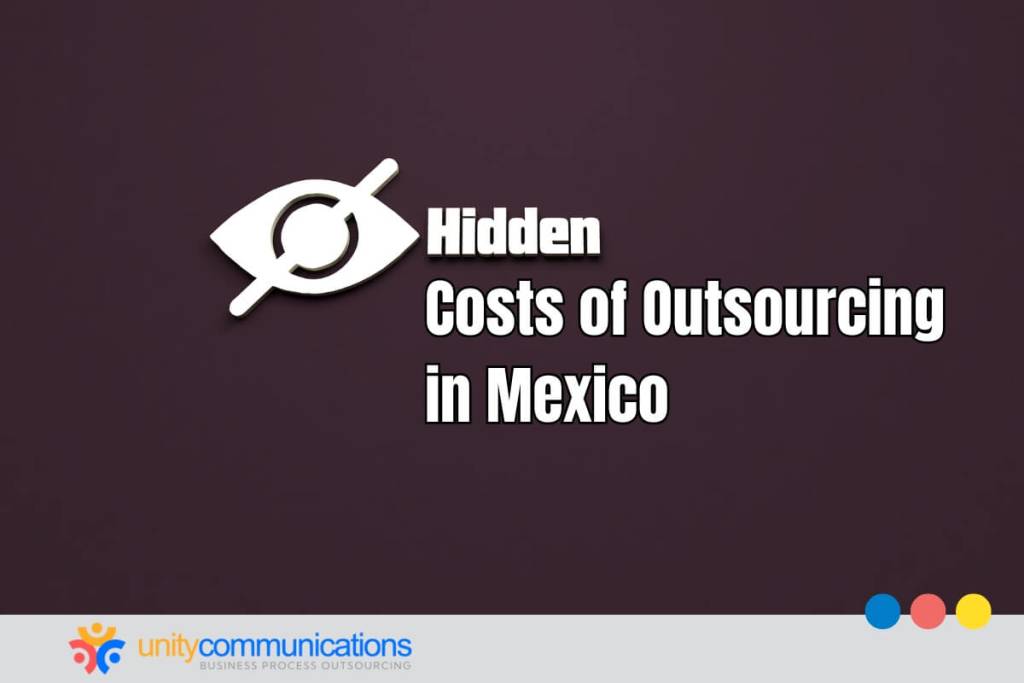Table of Contents
Outsourcing is a cost-effective strategy for businesses looking to improve efficiency, performance, and output. Third-party professionals and virtual assistants in Mexico offer outstanding support at a fraction of the cost of in-house operations.
However, outsourcing might entail hidden costs that can affect decision-making and overall success. Your organization must look beyond surface-level savings to uncover potential additional expenses.
This article explores the hidden costs of outsourcing in Mexico, highlighting practical strategies to avoid them and maximize your outsourcing investment. Dive in to learn how to optimize your approach effectively!
Labor costs beyond salary

Mexico is an excellent place to outsource due to low salaries compared to the United States. However, employment costs extend beyond wages. The country’s labor rules are strict with worker benefits, and your firm must understand the legal requirements to budget accurately and ensure compliance.
Legal requirements for employee benefits
Mexican law compels employers to offer personnel with benefits other than salary. Ignoring such regulatory obligations can lead to fines, conflicts, and operational shutdowns.
- Healthcare: Your company must register its employees with the Mexican Social Security Institute (IMSS), which provides healthcare, disability, and retirement.
- Profit-sharing (PTU): Mexican law requires firms to share a portion of their annual profits with employees.
- Mandatory bonuses: Workers are entitled to a year-end bonus (Aguinaldo) equivalent to 15 days’ wages.
Vacation, severance pay, and other benefits
In addition to salaries, Mexican employees can receive other forms of compensation, which employers must account for.
- Vacation: Professionals receive at least six vacation days after their first year, with additional days awarded per tenure.
- Severance pay: If an employee gets terminated without reason, employers must pay three months’ salary plus 20 days for each year of service.
- Extra perks: Meal coupons, transit subsidies, and supplementary insurance are additional benefits that vary by industry and collective agreement.
Tips to meet legal obligations
To avoid costly mistakes, stay abreast of legal standards by:
- Working with a local human resources (HR) professional to verify compliance with Mexican labor regulations.
- Using up-to-date payroll software to track vacation, severance, and incentives.
- Conducting regular audits to correctly calculate benefits.
- Drafting formal contracts to specify obligations and avoid future disputes or claims.
Training and onboarding costs
Training and onboarding also incur hidden costs when outsourcing to Mexico. Although the personnel might be highly competent, you will still need to invest time and resources to get them up to speed on your company’s operations. Proper onboarding reduces inefficiencies, but expenses can quickly escalate without careful planning.
Requirements for training third-party professionals
Training business process outsourcing (BPO) teams goes beyond technical skills. It requires time and effort to align them with your company’s standards and culture, adding to the overall cost.
- Extended training periods: Training might take months, depending on task complexity and worker familiarity.
- Managerial oversight: Supervisors need time to monitor training, adding extra costs.
- Specialized tools: Providing required software access raises onboarding expenses.
The hidden cost of language or cultural training
Language or cultural training might be needed to bridge communication gaps, especially for bilingual or international teams. Hence, it is among the hidden costs of outsourcing in Mexico.
- Language programs: Investing in language courses for bilingual proficiency can be costly.
- Cultural training: Employees might need workshops to understand U.S. or other markets’ business cultures.
- Longer adaptation periods: Cultural alignment might delay project start dates, increasing indirect costs.
How to implement an effective and cost-efficient onboarding process
A planned onboarding procedure reduces long-term costs by increasing staff productivity and minimizing mistakes.
- Standardize the training materials. Provide ready-made instructional guides and videos to help with the process.
- Mentoring programs. Match new hires with seasoned employees to shorten the learning curve without demanding additional resources.
- Performance tracking. Use tools to monitor onboarding success and highlight improvement areas, saving time for future employees.
Taxation and compliance costs

Outsourcing to Mexico provides cost advantages but also adds tax responsibilities. Your organization must understand corporate tax laws and comply with local regulations to avoid unexpected expenses and minimize financial burdens.
Mexico’s corporate tax laws and hidden liabilities
Companies in Mexico must adhere to special tax laws, and unfamiliarity might lead to costs that are not immediately evident.
- Corporate income tax (ISR): Mexican companies pay a 30% ISR rate, with possible deductions and credits based on their activities.
- Value-added tax (IVA): Outsourced services typically include a 16% IVA, increasing operating costs.
- Local and state taxes: Additional municipal or state taxes might apply, one of the disadvantages of outsourcing in Mexico.
Importance of compliance with tax regulations
Compliance with Mexico’s tax laws is essential to avoid costly penalties and legal issues that can disrupt operations and harm your business’s financial health.
- Fines for late filings: Missing tax deadlines can lead to significant penalties.
- Audit risks: Non-compliance increases the risk of audits, resulting in operational disruptions.
- Social security taxes: Non-compliance risks fines and liability.
Hiring tax advisors to mitigate unexpected costs
Contracting local tax advisors can help businesses manage complex tax regulations and avoid unexpected liabilities.
- Specialized knowledge: Local consultants are familiar with Mexican tax laws and can allow you to take advantage of applicable credits and deductions.
- Preventative audits: Tax advisors can conduct internal audits to catch potential issues before they escalate into costly problems.
- Access to expertise: Collaborating with Mexico outsourcing companies can provide valuable insights into tax obligations and help streamline compliance efforts.
Infrastructure and technology costs
One hidden cost of outsourcing in Mexico is infrastructure and technology spending, which are often overlooked. Organizations must invest in communication tools, software, and other solutions to maintain smooth operations, the costs of which can quickly balloon if not managed wisely.
Setting up communication tools and infrastructure for the BPO team
Building the proper infrastructure can improve communication with third-party professionals. However, this still requires significant investment.
- Video conferencing platforms: Tools such as Zoom or Microsoft Teams are essential for collaboration but require ongoing subscriptions.
- Project management software: Platforms such as Asana or Trello streamline task assignments but incur subscription fees.
- Time zone coordination: Systems might need adjustments to accommodate different time zones.
Expenses on software, security systems, and technology upgrades
The cost of conducting business successfully in Mexico includes keeping up with technology and securing sensitive data, which can raise expenditures.
- Software licensing: Third-party teams often require access to specific tools, increasing licensing fees.
- Security systems: Investing in firewalls and encryption is essential to protect business and client data.
- Hardware upgrades: Providing modern computers for BPO teams adds significant costs.
- Cloud services: Cloud storage for shared data leads to recurring expenses.
Ensuring cybersecurity compliance with local and international regulations
While pursuing cost-effective business process outsourcing to Mexico, your company must prioritize cybersecurity measures. Similarly, the effort can affect your budget.
- Legal compliance: Hiring local legal or compliance experts to stay updated with cybersecurity laws and avoid penalties is a significant investment.
- Compliance audits: Regular audits mean adherence to regulations, including the General Data Protection Regulation (GDPR), the Health Insurance Portability and Accountability Act of 1996 (HIPAA), and Mexico’s cybersecurity laws.
Project management and oversight

Outsourcing in Mexico demands robust project management for successful operations. Although labor costs are cheaper, managing remote teams adds expenses, including travel and daily oversight. Companies should consider project management costs to avoid operational inefficiencies.
Costs associated with managing the BPO team
Managing a third-party team involves more than remote check-ins. Project oversight costs can quickly add up if not planned carefully.
- Travel expenses: Regular site visits might be needed to ensure alignment, adding flight costs, accommodations, and per diems.
- Local supervisors: Hiring local managers to oversee daily tasks might become essential, increasing labor costs.
- Monitoring software: Using tools to track productivity, time management, and timelines can carry subscription fees.
- Team-building initiatives: Bridging the gap between in-house and BPO teams might require virtual or in-person events to boost collaboration.
How to avoid micromanagement and streamline team oversight
Micromanaging a remote team wastes time and adds unnecessary stress. Streamlining your oversight processes can save time and reduce expenses.
- Automate reporting. Set up automated tools that provide regular progress updates without the need for constant check-ins.
- Create clear goals and identify key performance indicators (KPIs). Outline objectives, KPIs, and deliverables upfront so the BPO team understands their targets without requiring daily supervision.
- Empower team leads. Delegate authority to trusted team leads, allowing them to manage daily operations and escalate issues only when necessary.
- Set up regular check-ins. Instead of daily meetings, schedule weekly or biweekly status updates to track progress without overwhelming the team.
- Pursue asynchronous communication. Encourage asynchronous tools (e.g., Slack and email), where team members can respond anytime, reducing the need for real-time communication.
Avoiding hidden costs: best practices
The hidden costs of outsourcing can undermine the financial and operational benefits Mexico BPO sector can offer. Consider the following best practices to avoid unexpected expenses and maintain, if not improve, your company’s profitability:
Detailed contracts outlining all expectations, deliverables, and costs
A well-structured contract prevents misunderstandings and disputes, reducing the risk of unexpected costs. Take the following tips:
- Clear deliverables: Specify outputs, deadlines, and terms of a BPO contract to avoid ambiguity.
- Cost breakdown: Include all expenses, including hidden fees such as taxes or overtime.
- Performance metrics: Outline success metrics and penalties for missed targets.
- Termination clauses: Detail conditions for contract cancellation and other related costs.
Conducting thorough due diligence on outsourcing partners
Choosing the right BPO vendor is crucial for lowering the hidden costs of outsourcing in Mexico. To confirm alignment and reliability, perform due diligence by:
- Background checks: Investigate the partner’s financial stability and operational history.
- Client references: Request references to gauge satisfaction and performance.
- Cultural fit: Assess if the partner aligns with your company’s values and communication style.
- Expertise verification: Confirm the partner has the necessary skills.
Setting up contingencies for unexpected expenses and challenges
Despite planning, unexpected costs can arise, so having contingencies helps manage challenges without financial strain.
- Budget reserves: Allocate part of your budget for unforeseen expenses as a safety net.
- Flexible contracts: Include in the business process outsourcing agreement terms that allow adjustments based on changing conditions.
- Regular reviews: Schedule financial reviews to assess performance against the budget.
- Crisis management plans: Prepare for setbacks to enable quick responses.
The bottom line

The hidden costs of outsourcing in Mexico include taxes, compliance, training, and project management. Careful planning and budgeting are essential to avoid unexpected expenses.
Unity Communications is an award-winning BPO provider of virtual assistant, call center, contact, and employer of record services in Mexico, U.S., and the Philippines. Let’s connect so we can help your business optimize outsourcing costs!




